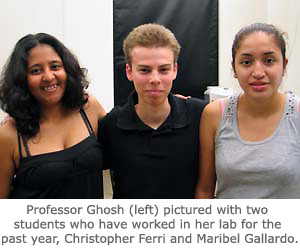

In the past decade, computing and communications leaders have realized that electronic devices will soon become so small, the particles they use to store and process data will start acting strange.
“On the quantum level, stuff stops behaving in the classical way,” UC Merced physics professor
Sai Ghoshexplained. “Bizarre things happen. Imagine two cars colliding. We expect them to bounce off each other. But if you’re looking at tiny particles at very low temperatures - the quantum world - the two objects could occupy the same space at the same time.”
That would ruin the way a traditional computer functions. But researchers have begun to explore avenues where information technology can continue to innovate and circumvent these effects.
Ghosh and others in her field see an opportunity to develop a new computing architecture that would use quantum properties and provide advantages over existing technologies. Quantum computing applies the principles that won Albert Einstein his first Nobel Prize, as well as a plan outlined by Nobel Laureate Richard Feynman, to information storage and processing.
Computers that use the quantum aspects would not only eliminate size and density limitations, they would function much faster. Quantum computing could process multiple pieces of information at the same time, instead of in series, because unlike today’s information bit that must be either a 0 or a 1, a quantum bit or “qubit” could be both at once.
Ghosh takes two approaches to quantum computing. The first involves chemically synthesized quantum dots produced by UC Merced chemistry Professor
David Kelley. Ghosh is working to manipulate these tiny bits of material - only a few atoms - into configurations of qubits that could be useful for computer chip devices.
The other approach uses natural crystals, where particles that could function as qubits already exist in structured systems. These “frustrated systems” have enough constant change in the spin of their potential qubits, and therefore enough flexibility, that scientists like Ghosh think they can manipulate the particles to store and process data.
It sounds a little sci-fi. But Ghosh says quantum computing is an inevitable evolutionary step that will revolutionize the computer industry.
“You grow up watching Star Trek, but then when you investigate you learn that these things are not just probable - they’re going to happen,” she said.






